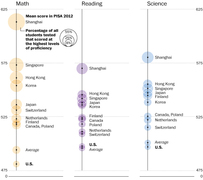
Many adults (especially teachers) are keenly aware that standardized tests are not true preparation for the real world. Only in niche jobs does one need to be able to prove the Pythagorean Theorem in order to demonstrate marketable skills. Yet, our country seems obsessed with comparing these scores in order to rate and evaluate students and - more recently - teachers. Not only does this seem quite narrow in focus but it misses the entire point of fostering a creative society.
Recently a guest columnist on the Seattle Times wrote, "the preponderance of data clearly demonstrates that teachers are the most important school-based factor in student achievement." While this statement is fact, there are a number of other pieces of information missing. For example, teacher quality is not the majority (over 50%) of the influence on students, just the plurality (largest percentage). Perhaps other factors would add up to more than teachers if combined. Additionally, what about the out-of-school factors? There are a host of things that could be wrong holding back a student's achievement before s/he enters the classroom. 31% of children under the age of 17 currently live in poverty in New York City; that number is 40% in Philadelphia.
Now, of course it is important to remember the motto shared by so many education reformers: Poverty is not Destiny. I truly believe that and push my student's to succeed even if they lack basic supplies. But, that motto does not mean it is not a large factor.
When I have students who have not eaten in the morning, they will do worse; when I have students who are child parents, they will do worse; when I have students who have no consistent adult figure in their lives, they will do worse.
The best way for teachers to get involved in all of this is to forge positive relationships with children and make them think critically inside the classroom. Unfortunately, these are the exact traits that are so difficult to measure: empathy, caring, and perseverance. Perhaps it is better to put money into that evaluation instead of the New York Regents Exam.


 RSS Feed
RSS Feed
